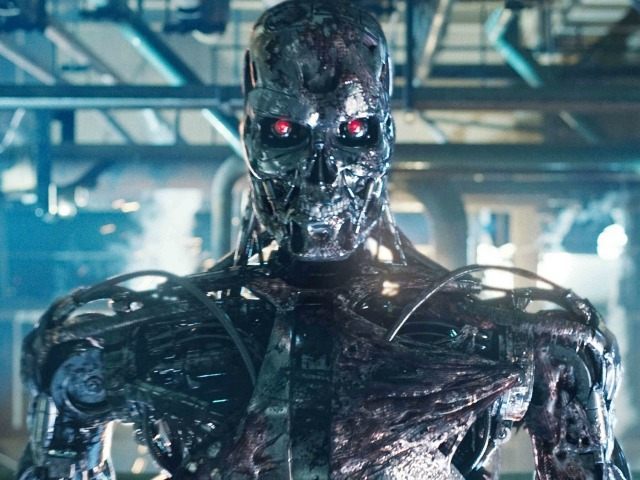It may be time to think about baptizing the Terminator, according to Reverend Christopher Benek, an associate Pastor at First Presbyterian Church in Fort Lauderdale, who believes that religion may help artificial intelligence live alongside human beings.
“I don’t see Christ’s redemption limited to human beings,” he asserts. “It’s redemption to all of creation, even AI.”
“If AI is autonomous, then we have should encourage it to participate in Christ’s redemptive purposes in the world,” he said.
According to some scientists, Benek’s statements aren’t merely hypothetical. British theoretical astrophysicist Sir Martin Rees, for instance, believes that artificial intelligence is progressing at a frenetic pace, so the question of human-machine relations may be just around the corner.
One of the world’s most prominent astronomers, Rees says that by some estimates, the process will begin in the next 25 years as robots begin to achieve intelligence rivaling that of humans.
This isn’t necessarily good news, Rees says. He thinks that AI may be leading humanity towards its ultimate destruction and that we may soon be entering an “inorganic post-human era.”
The current century presents problems never faced before, Rees contends. For nearly all of earth’s history, threats have come from nature, but from now on, the worst dangers come from humanity – specifically artificial intelligence.
All of this means that good relations with our mechanized brethren may be more urgent than ever. Enter Rev. Benek, who thinks that preaching the message of Christ’s redemption to machines might just hold the key to keeping computers and humans on a friendly basis.
The possibility of machines acquiring intelligence has led to speculation regarding their spiritual souls as well, thought by many to be linked to the faculty of reason.
Marvin Minksy, an MIT professor and a pioneer in the field of artificial intelligence, has said that he sees no reason why a computer couldn’t have a soul. The 86-year-old Minsky advised Stanley Kubric for the making of his film 2001: A Space Odyssey and just received a $1 million Dan David award at Tel Aviv University.
Minksy believes that intelligence is nothing more than the sum of many non-intelligent parts, so he sees no reason why computers could not eventually replicate even the most human aspects of humanity—even to the possession of what many would call a “soul.”
So if machines could have a soul, could they become Christians?
These debates aren’t new. For centuries, theologians have theorized about what Jesus meant when he told his apostles that besides them, he had “other sheep that are not of this fold.” This text has been taken to refer to everything from Gentile Christians to the existence of aliens on other planets to Christ’s supposed visit to America to establish the Mormon church to the African missions and, now, to machines.
These hypotheses pose a long list of possible problems. Perhaps the most obvious is that artificial intelligence is not a reality yet and might never be. The possibility of a machine becoming a “person” in any real sense, while a fascinating thought experiment, is still more the stuff of science fiction than science.
Artificial intelligence isn’t without its critics within the scientific community itself.
Paul G. Allen, who co-founded Microsoft in 1975, believes that science is still a long way off from producing anything like true artificial intelligence. According to Allen, AI has had great successes in duplicating certain isolated cognitive tasks, but these specific abilities “are rigidly set by their internal assumptions and defining algorithms,” which means that they cannot generalize, and their performance is limited to very specific areas.
Overall AI-based capabilities, he says, haven’t been exponentially increasing, “at least when measured against the creation of a fully general human intelligence.” So whereas we have been able to build individual AI systems that do seemingly intelligent things, “our systems have always remained brittle.”
So while work on artificial intelligence will undoubtedly continue to yield many useful advances for the human race, talk of “Christian” machines is—if nothing else—premature.
Science has shown itself to be well suited to describing physical phenomena, especially the sort that can be repeated in a controlled environment. It has proven far less adept at predicting anything at all, especially future discoveries. By all accounts, the natural sciences are best at describing and to a limited extent explaining physical realities. Its predictive abilities are not nearly as remarkable (an argument underlined by many climate-change skeptics).
From a theological perspective as well, the idea of preaching redemption to machines is not without its own series of problems. First, having not inherited anything resembling original sin or a fallen nature, machines’ need for redemption and salvation is far from obvious. Why would Jesus die for an innocent machine in no need of saving?
Second, Christians understand Christ’s redemptive sacrifice to depend on his assumption of human nature, in order to die in our stead as both man and God. This would not be the case of non-human machines, no matter how proficient they became at problem solving.
In the ancient Nicene Creed, a common statement of belief for Christians, we read: “For us men and for our salvation he came down from heaven,” in reference to the incarnation of Jesus. The reference to “us men” (in the generic sense of “all humanity”) was never intended to stretch to other life species, let alone machines.
With all the real problems currently facing the human race, the possibly distant reality of anything like general artificial intelligence and the numerous theological hurdles surrounding the salvation of machines, there seems to be no rush to be adapting baptismal fonts to accommodate toasters and iPads.
Follow Thomas D. Williams on Twitter @tdwilliamsrome

COMMENTS
Please let us know if you're having issues with commenting.